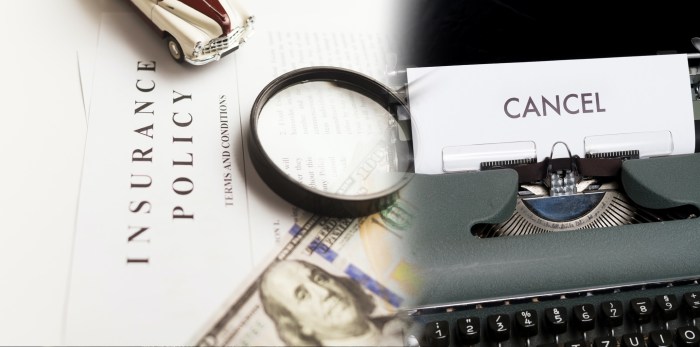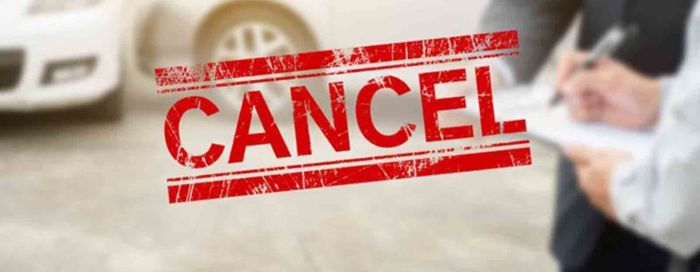Can you cancel claim car insurance – Can you cancel a car insurance claim? That’s the burning question many find themselves facing after a fender bender or unexpected mishap. Navigating the world of car insurance claims can feel like a minefield, especially when you’re unsure if canceling a claim is even an option. This guide cuts through the jargon, offering a clear understanding of when and how you might be able to back out of a claim, exploring the potential consequences and alternative solutions.
We’ll delve into the nitty-gritty of cancellation policies, exploring the reasons behind cancellation requests, the step-by-step process, and the long-term impact on your premiums. We’ll even cover the legal aspects and provide actionable advice to help you make the best decision for your situation. So, buckle up, and let’s unravel the mysteries of canceling car insurance claims.
Understanding Cancellation Policies
So, you’ve filed a car insurance claim, but things have changed. Maybe you’ve found a way to resolve the issue yourself, or perhaps the damage isn’t as bad as you initially thought. Whatever the reason, knowing how to cancel a car insurance claim is crucial. It’s not always a straightforward process, and understanding the ins and outs of cancellation policies can save you time, money, and a whole lot of headache.
Claim Cancellation Timeframes
The timeframe for canceling a car insurance claim varies greatly depending on the stage of the claim process and your insurance provider. Generally, you have a better chance of canceling before any payments are processed or investigations are completed. Once your claim moves into active investigation or repair stages, cancellation becomes increasingly difficult. Many insurers allow cancellation within a few days to a couple of weeks of filing, but it’s always best to contact your provider directly as soon as you decide you want to cancel. Waiting too long can significantly impact your ability to withdraw your claim.
Canceling a Claim Before Payment
Canceling a claim before any payments are made is usually the easiest route. Most insurers will readily accept a cancellation request under these circumstances. The process typically involves contacting your insurer directly via phone or email, clearly stating your intention to cancel, and providing the claim number. They may require you to fill out a cancellation form. Be sure to keep a record of your cancellation request, including the date and method of contact.
Comparison of Cancellation Policies Across Providers
Cancellation policies differ significantly between insurance companies. Some insurers have more lenient policies than others, offering wider windows for cancellation and less stringent requirements. Others may have stricter policies, potentially charging cancellation fees or imposing penalties. For example, some providers might allow cancellations within a week with no penalty, while others may only allow cancellations within 24 hours. This lack of standardization highlights the importance of carefully reviewing your specific policy documents.
Situations Permitting Claim Cancellation
There are several situations where canceling a car insurance claim might be permissible. This could include:
- Minor damage that you can afford to repair yourself.
- A miscalculation of the damage extent, leading to an overestimation of the claim.
- Resolution of the issue directly with the other party involved.
- Discovery of alternative means of compensation (e.g., through another insurance policy).
Cancellation Fees Across Insurance Companies
It’s important to understand that some insurers may impose cancellation fees, particularly if the claim has progressed beyond the initial reporting stage. These fees can vary widely depending on the provider and the stage of the claim.
| Insurance Company | Cancellation Fee (Before Payment) | Cancellation Fee (After Payment) | Cancellation Deadline |
|---|---|---|---|
| Company A | $0 | $50 – $100 (Variable) | 7 days |
| Company B | $25 | $150 | 24 hours |
| Company C | $0 | N/A (No cancellation after payment) | 14 days |
| Company D | $0 | N/A (Case-by-case basis) | 5 days |
*Note: These are hypothetical examples and actual fees and deadlines may vary. Always check your specific policy documents for details.*
Reasons for Claim Cancellation
So, you’ve been in a fender bender, or maybe something more serious. You filed a claim with your car insurance, but now you’re thinking about canceling it. This isn’t an uncommon situation, and understanding the whys and wherefores is crucial before you make a decision that could have significant repercussions. Let’s dive into the reasons behind canceling a car insurance claim and the potential fallout.
The decision to cancel a car insurance claim is rarely straightforward. It involves a complex interplay of personal circumstances, financial considerations, and ethical implications. While it might seem like a simple solution to a stressful situation, the long-term consequences can be far-reaching, impacting your financial stability, your insurance premiums, and even your legal standing.
Common Reasons for Claim Cancellation
Individuals might opt to cancel a car insurance claim for several reasons, often stemming from a desire to avoid increased premiums, maintain a clean driving record, or perhaps even due to a misunderstanding of the claims process. For instance, someone with minor damage might choose to self-repair to avoid the hassle of a claim, while others might underestimate the extent of the damage and later realize they need more comprehensive coverage than initially anticipated. The perceived inconvenience or the belief that the claim is insignificant can also contribute to the decision to cancel.
Consequences of Canceling a Claim
Canceling a car insurance claim can have several undesirable consequences. Financially, you’ll be responsible for all repair or replacement costs yourself. This can be a significant burden, especially if the damage is extensive. Legally, canceling a claim might jeopardize your ability to pursue compensation for injuries or losses in the future, should your condition worsen or other issues arise related to the accident. Furthermore, your insurance company might take note of the canceled claim, potentially impacting your future premiums. Your insurer might view this action negatively, leading to higher rates in the future. They might also refuse to cover future claims based on your history of canceling past claims.
Ethical Considerations in Claim Cancellation
The ethical considerations surrounding canceling a car insurance claim are complex. While the decision is ultimately yours, it’s important to consider the potential impact on others involved in the accident. If you’re at fault, canceling the claim might leave the other party without recourse for their damages. This can lead to a sense of injustice and potentially even legal action against you. Therefore, it’s essential to weigh the potential impact on all parties involved before making a decision. Honesty and fairness should be guiding principles in navigating this situation.
Scenarios Where Claim Cancellation Might Be Beneficial
There are limited scenarios where canceling a claim might be beneficial.
- Minor Damage, Self-Repair Capability: If the damage is extremely minor and you possess the skills and resources to repair it yourself at a cost significantly less than your deductible, canceling might be a reasonable option.
- Misunderstanding of Coverage: If you initially filed a claim due to a misunderstanding of your policy coverage, and you subsequently realize the damage is covered by another means, canceling might be considered.
It’s crucial to understand that these scenarios are exceptional. Carefully assess the situation before acting. Consult your insurance provider for clarification on the implications.
Potential Impacts of Claim Cancellation, Can you cancel claim car insurance
The impacts of canceling a car insurance claim can be categorized as follows:
| Category | Impact |
|---|---|
| Financial | Increased out-of-pocket expenses for repairs or medical bills; potential increase in future premiums. |
| Legal | Loss of legal recourse for damages; potential legal action from other parties involved. |
| Insurance | Higher premiums in the future; potential denial of future claims. |
| Ethical | Potential for unfairness to other parties involved in the accident. |
The Cancellation Process

Source: mychoice.ca
So, you’re wondering, “Can you cancel a car insurance claim?” It’s tricky, often depending on the specifics of your policy and the stage of the claim. For comprehensive coverage and clear answers, consider checking out what kimball cooke insurance offers; their policies might offer more clarity on cancellation options. Ultimately, understanding your policy’s fine print is key to navigating this situation successfully.
So, you’ve decided to cancel your car insurance claim. Maybe the damage wasn’t as bad as you initially thought, or perhaps you’ve found another way to handle the repairs. Whatever the reason, knowing the process is key to a smooth experience. Navigating insurance claims can be tricky, but canceling one doesn’t have to be a headache. Let’s break down the steps.
Cancelling a car insurance claim usually involves contacting your provider directly and providing specific information. The exact process might vary slightly depending on your insurer, but the core elements remain consistent. Be prepared to be patient and persistent; sometimes getting through to the right person can take a little time.
Contacting Your Insurance Provider
Initiating the cancellation begins with contacting your insurance provider. Most companies offer multiple contact methods, including phone, email, and online portals. Choosing the method that best suits your preference is crucial. For example, if you prefer a quick resolution and immediate feedback, a phone call might be the best option. However, if you prefer a documented record of your request, an email might be more suitable. Remember to keep a record of your communication, including date, time, and the name of the representative you spoke with.
Required Documentation for Claim Cancellation
Depending on your insurer and the specifics of your claim, you might need to provide certain documentation to support your cancellation request. This could include the original claim number, a detailed explanation of why you’re canceling, and potentially supporting documentation like estimates for repairs if you opted for a different repair method. In some cases, you might need to submit photos of the damage, even if you’ve decided not to proceed with the claim. Always check with your insurer for their specific requirements to avoid delays.
Cancelling a Claim Through Online Portals
Many insurance companies offer online portals where you can manage your policy and claims. These portals often include a section where you can submit a claim cancellation request. Usually, you’ll need to log in to your account, navigate to the claims section, and find an option to cancel or withdraw your claim. The portal might guide you through the process, asking for relevant information like your claim number and reason for cancellation. The advantage of this method is that it provides a documented record of your cancellation request.
Cancelling a Claim Via Phone
Cancelling a claim via phone often involves calling your insurance provider’s claims department. Be prepared to provide your policy number, claim number, and a clear explanation for canceling the claim. The representative might ask clarifying questions to ensure they understand your request. Keep a record of the date, time, and the representative’s name. If possible, request a confirmation email or letter to document the cancellation. A step-by-step guide might look like this:
- Call your insurance provider’s claims department.
- Clearly state your intention to cancel your claim.
- Provide your policy number and claim number.
- Explain your reasons for cancellation.
- Answer any clarifying questions from the representative.
- Request confirmation of the cancellation, either via email or mail.
Impact on Future Insurance Premiums
Canceling a car insurance claim might seem like a smart move to avoid a premium hike, but it’s a decision with long-term consequences. Insurance companies meticulously track your driving history and claims, and canceling a claim can significantly impact your future premiums, potentially more so than if you’d processed the claim. Understanding these impacts is crucial before making this decision.
Insurance companies assess risk based on a complex algorithm that considers numerous factors. While canceling a claim might seem to temporarily avoid a premium increase, it can create a false sense of security. The act of canceling itself can be flagged as a potential risk indicator. They might perceive it as an attempt to hide potential issues or avoid responsibility, leading to a higher perceived risk profile for you as a driver.
Risk Assessment After Claim Cancellation
When you cancel a claim, the insurance company doesn’t simply erase the incident from your record. They still have access to police reports, repair estimates, and other documentation related to the incident, even if the claim itself is withdrawn. This information can be used to build a more nuanced picture of your driving behavior and risk profile. For instance, if the incident involved a significant amount of damage or suggests a pattern of negligence, the insurer may still raise your premiums, even without an official claim on file. They might interpret the cancellation as an indication of higher risk than a processed claim would suggest.
Long-Term Effects of Claim Cancellation Versus Proceeding
Proceeding with a legitimate claim, while resulting in a short-term premium increase, often leads to more predictable long-term consequences. Your premiums will likely increase, but the increase will be based on the actual cost of the claim and your overall driving record. Canceling a claim, however, introduces uncertainty. Your insurer may apply a larger premium increase based on their interpretation of your actions. Moreover, future insurers will have access to this information through your driving record, potentially leading to higher premiums with them as well.
Examples of Claim Cancellation Impact on Future Applications
Imagine applying for insurance after canceling a claim for a minor fender bender. Even though the damage was minimal, the cancellation could be interpreted as an attempt to avoid paying higher premiums. This could result in a higher premium or even denial of coverage by the new insurer. Conversely, if you had processed the claim, the impact on your future premiums would be more transparent and potentially less severe. Similarly, if you cancel a claim involving a more significant accident, the negative impact on your future applications could be substantial, potentially leading to higher premiums or even difficulty securing insurance.
Potential Premium Changes Based on Claim Cancellation Scenarios
| Scenario | Initial Premium | Premium After Claim (Processed) | Premium After Claim Cancellation |
|---|---|---|---|
| Minor Fender Bender | $1000 | $1150 | $1250 – $1400 |
| Moderate Accident (Your Fault) | $1000 | $1300 – $1500 | $1500 – $2000+ |
| Significant Accident (Your Fault) | $1000 | $1700 – $2500+ | $2000+ or Policy Denial |
Alternatives to Claim Cancellation: Can You Cancel Claim Car Insurance

Source: akaninsurance.ca
Canceling a car insurance claim might seem like the easiest route, but it could have long-term consequences. Before you take that step, explore alternative solutions that could save you money and protect your driving record. Often, a little negotiation can go a long way.
Negotiating settlements with insurance companies can be a complex process, but it’s often a viable alternative to canceling your claim. Understanding your rights and the claims process is crucial for successful negotiation. Remember, insurance companies are businesses; their primary goal is to minimize payouts. Knowing this can help you approach negotiations strategically.
Negotiating Settlements with Insurance Companies
Effective negotiation requires preparation. Gather all relevant documentation, including photos of the damage, police reports (if applicable), and repair estimates. Clearly articulate the extent of your damages and the basis for your claim. Be polite but firm in your communication, and avoid emotional outbursts. Present your case logically and factually, focusing on the objective evidence supporting your claim. A successful negotiation often involves finding a middle ground that satisfies both parties. For example, if the insurance company offers a settlement lower than your repair estimate, you could propose a compromise, perhaps splitting the difference or negotiating a lower deductible in exchange for accepting the settlement. Remember to get everything in writing.
Dispute Resolution Methods
Several methods exist for resolving disputes with insurance companies when negotiations fail. Mediation, for example, involves a neutral third party helping both sides reach a mutually acceptable agreement. Arbitration is more formal; a neutral arbitrator hears both sides and makes a binding decision. Litigation, the most adversarial option, involves filing a lawsuit. Each method has its advantages and disadvantages. Mediation is often less expensive and time-consuming than arbitration or litigation but lacks the binding power of arbitration or a court judgment. Arbitration is generally faster and less costly than litigation but still more formal and expensive than mediation. Litigation is the most expensive and time-consuming but offers the potential for the largest award.
Successful Negotiation Strategies
One successful strategy is to present a detailed breakdown of your damages, including repair costs, rental car expenses, and any lost wages. Another is to research similar cases and use them to support your claim. If the insurance company is low-balling you, you can point to precedents where similar claims resulted in higher settlements. Remember to remain calm and professional throughout the process, even if the insurer is being difficult. Document every interaction, including phone calls, emails, and letters. This documentation can be invaluable if the dispute escalates. For instance, if you’re dealing with a significant injury claim, consulting with a personal injury lawyer could greatly improve your negotiating position and provide expert guidance throughout the process.
Decision-Making Flowchart
The decision of whether to cancel a claim or pursue alternative options depends on several factors. The following flowchart illustrates a simplified decision-making process:
[Imagine a flowchart here. It would start with a box: “Car Accident/Damage.” This would lead to two boxes: “Attempt Negotiation with Insurance Company” and “Cancel Claim.” The “Attempt Negotiation” box would lead to two more boxes: “Successful Negotiation? Yes/No.” A “Yes” would lead to “Settlement Reached.” A “No” would lead to a box with options: “Mediation,” “Arbitration,” “Litigation.” Each of these would lead to a final box: “Resolution.”]
The flowchart visualizes the steps involved, helping one weigh the pros and cons of each option based on the specifics of the situation. The ultimate goal is to find the most efficient and effective way to resolve the claim fairly.
Legal Considerations
Canceling a car insurance claim isn’t as simple as hitting “delete.” There are significant legal ramifications to consider, and acting rashly could land you in hot water. Understanding your rights and responsibilities is crucial to avoid potential problems down the line. This section Artikels the legal landscape surrounding claim cancellations, highlighting potential pitfalls and offering a clearer picture of your legal standing.
The legal implications of canceling a car insurance claim hinge heavily on the circumstances. While you generally have the right to withdraw a claim before your insurer has fully processed it, doing so after the insurer has begun investigating or has already paid out on the claim opens you up to a much greater level of scrutiny. Intentionally misleading your insurer, or attempting to defraud them by canceling a legitimate claim, carries severe consequences.
Fraudulent Claim Cancellation
Attempting to cancel a claim after it’s been partially or fully processed, particularly if done to avoid paying premiums or to receive benefits without incurring liability, is considered insurance fraud. This is a serious crime with potential penalties ranging from hefty fines to imprisonment, depending on the jurisdiction and the specifics of the case. Insurance companies actively investigate suspicious cancellations, and evidence of fraudulent activity can lead to criminal charges and a permanent stain on your insurance record. For example, if you staged an accident and then tried to cancel the claim after receiving a payout, you would be committing a serious crime with severe legal consequences.
Rights and Responsibilities of the Insured Party
During the cancellation process, you have the right to be treated fairly and transparently by your insurer. This includes receiving clear and concise communication about the implications of your actions. However, you also have the responsibility to provide accurate information and to act in good faith. Withholding information or providing false statements during the cancellation process can lead to accusations of fraud, even if the initial claim itself was legitimate. For example, failing to disclose relevant information about the accident after initiating a claim could be interpreted as acting in bad faith.
Legal Precedents Related to Claim Cancellations
While specific case law varies by jurisdiction, numerous precedents highlight the seriousness of fraudulent claim cancellations. Courts have consistently upheld convictions for individuals who attempted to defraud insurance companies through false claims or the cancellation of legitimate claims. These cases often involve detailed investigations by insurance companies and law enforcement agencies, demonstrating the lengths to which insurers will go to protect themselves from fraudulent activity. The details of these cases are usually confidential, but the consistent outcome underscores the potential for severe penalties.
Potential Legal Issues Associated with Canceling a Car Insurance Claim
- Breach of contract: Canceling a claim might be considered a breach of the insurance contract, leading to potential legal action from the insurer.
- Fraudulent misrepresentation: Providing false information to your insurer during the cancellation process is a serious offense.
- Civil lawsuits: If your cancellation impacts another party involved in the accident, they could sue you for damages.
- Criminal charges: Insurance fraud is a criminal offense with potential jail time and substantial fines.
- Increased future premiums: Even if you avoid criminal charges, a canceled claim can significantly impact your future insurance rates.
End of Discussion

Source: comparepolicy.com
Ultimately, deciding whether to cancel a car insurance claim is a personal decision with significant implications. Weighing the potential financial, legal, and reputational consequences is crucial. While canceling a claim might seem like a tempting solution in certain situations, it’s essential to thoroughly understand the process and explore all available alternatives before making a final decision. Remember, seeking professional advice from an insurance expert or legal counsel can provide invaluable support during this process. Don’t navigate this alone – arm yourself with knowledge and make an informed choice.

